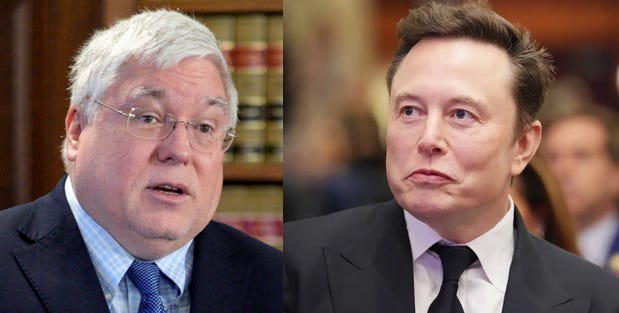D.C. Memo: Is Elon Musk Ready to Go to War with His Third GOP Governor over BEAD?
▪️Call It Kevin Martin Day: ESPN Goes a la Carte ▪️BroadbandNow Dumps on Alaska Broadband▪️Louisville Ups Pressure on Copper Robbers▪️Alaska Airlines Picks Starlink▪️Layton: USF Needs Big Tech's Help
BEAD: Is Elon Musk ready to go to war with a third Republican Governor in less than two weeks over BEAD programing funding? Some think it will happen, based on the numbers that came out of West Virginia two days ago. How did it go for Musk’s Starlink in the Mountain State? Not too good. “Satellite has been awarded only 6% of locations and 1% of the funds,” said New Street Research analyst Vikash Harlalka in a client report posted yesterday. That translated to $6.4 million to serve 4,241 locations. Meanwhile, the West Virginia Office of Broadband awarded 94% of locations and 99% of the $625 million in funds to fiber. The results in West Virginia tracked with recent BEAD awards in Virginia under GOP Gov. Glen Youngkin. Virginia awarded SpaceX $3.3 million to serve 5,579 locations, trigging a strong rebuke from the low Earth orbit satellite Internet service provider. Starlink parent SpaceX also had issues with the meager Starlink allocations in the BEAD plan in Louisiana developed under Republican Gov. Jeff Landry. SpaceX has been clear to Virginia and Louisiana: Change your plans or we’ll fight it out in front of NTIA administrator Arielle Roth in the Commerce Department. In a video posted Tuesday, Republican West Virginia Gov. Patrick Morrisey dropped a few hints suggesting his revised BEAD awards would sail through NTIA after the Sept. 4 deadline to file. “We've been having a lot of discussions with the Trump administration, and this is a big deal. We're handling it the right way. We went in very early and worked closely with the Trump administration to get near the front of the line. And right now, we're about the third-fastest here in the country in terms of getting our applications in,” Morrisey said. Louisiana was the first to file. “SpaceX has already challenged the proposals submitted by Virginia and Louisiana. We expect them to challenge West Virginia results as well,” NSR’s Harlalka said. He also pointed out that small ISPs have not been crowded out by big ISPs like Comcast and Frontier, though both did well in West Virginia (see chart below). (More after paywall.)


